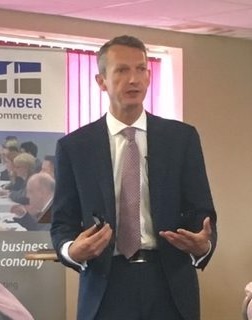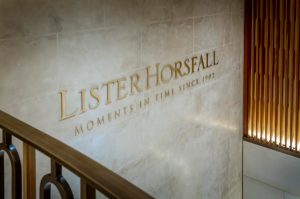Chief economist at the Bank of England talks of tight jobs market as he visits the region

The Bank of England’s Chief Economist yesterday spoke about the UK’s tight labour market, stating that despite a “jobs bonanza” in recent years as part of the strongest economic recovery since World War Two, factors had led to skills shortages and a disparity in pay.
Andy Haldane was speaking in Scunthorpe, as part of an event hosted by Hull and Humber Chamber of Commerce. He said: “Problems at the British Steel plant in the town have put at risk the jobs of 5,000 workers and a further 20,000 in its supply chain. Hopefully, a new buyer can be found and jobs in the town and beyond can be assured.
“This is the latest chapter in what has been a long and sometimes painful story for the UK steel industry recently. It has been a recurrent theme of my visits around the UK, including in Redcar and Port Talbot.
“The loss of signature industries can leave lasting social and economic scars – jobs lost, families disrupted, communities decimated. It is a pattern we see repeated across many industries in many advanced economies. It has been a key cause of the disaffection and disconnection felt by many and a potent polarising force in our politics, policies and societies.”
On the day Boris Johnson was confirmed as the new leader of the Conservative Party, Haldane talked about the jobs market over the last decade, its future prospects, the outlook for the global economy and Brexit.
He said that since 2012, 3.4m new jobs had been created across the UK as part of the strongest economic recovery since World War Two, but that in turn had created a tight jobs market which is driving up pay, and a skills shortage.
UK employment is at its highest level for half a century at 61.5% – creating a “jobs bonanza” – and unemployment at its lowest at 3.8%, but he said people are wary of taking risks and moving jobs or locations to climb up the jobs ladder.
The flexibility available to the self-employed, agency workers and those on zero-hours contracts can be welcome, he said; but could also lead to uncertainty. Haldane said that people in permanent employment now see pay levels below the levels they were at a decade ago as many people agreed to cuts in their pay and packages to keep their jobs during the financial crisis.
Haldane said trade wars in recent years across the planet had got “under the skin” of businesses. Today, the balance of global risks has shifted to the downside, creating a headwind for UK trade abroad. Some central banks have eased monetary conditions to help trade.
He said that he believed the risk of a no deal Brexit has now risen, and the markets now expect interest rates to be cut by the Bank, which had previously predicted a steady increase in interest rates.
Haldane added: “The UK economy has also been facing high and rising degrees of uncertainty about future trade, though the source has been different – Brexit. According to our Decision Maker Panel, the number of companies reporting Brexit as among their top three risks have risen from one-third in April 2018 to over 50% now. Most recently, the perceived risk of a “no deal” Brexit has risen, with betting odds placing a roughly 30% probability on that event, double the probability earlier this year.”
Haldane added that the Bank’s monetary policy needed to be “flexible and fleet of foot” and the country needs to be “producing stuff that other countries want to buy” to ensure productivity and exports could remain high in the future.








